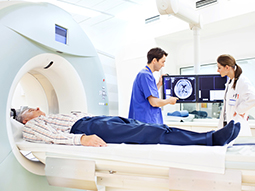-
Cardiac CT scans produce high-resolution images of the arteries, chambers, and valves of the heart. Unlike other methods used to detect coronary disease, cardiac CT provides direct visualization of the entire system of coronary arteries, and can detect coronary disease whether or not a blockage is present. Other methods use an indirect means to determine whether or not coronary blockage is present, and, therefore, cannot detect the early disease before symptoms occur. Surprisingly, most heart attacks arise from coronary disease lesions that do not block the artery. The Philips 256-slice iCT scanner is the latest generation of this advanced medical technology. In comparison to a traditional CT scanner, the multi-slice scanner is faster, and provides sharper and more detailed images. This speed allows even fast-moving organs like the heart to be accurately captured in images. Further, patients are exposed to lower radiation exposure during scanning.
-
Cardiac magnetic resonance imaging (MRI) is a sophisticated, non-invasive way to view the heart and nearby blood vessels. Doctors are able to see the structure and function of the heart through this unique and safe method used to determine possible heart conditions.
Our providers

Expert radiology care
Getting the care you need starts with seeing one of our radiologists.
Related services
Ask MedStar Heart & Vascular Institute
Have general questions for our heart and vascular program? Email us at AskMHVI@medstar.net. If you have clinically-specific questions, please contact your physician’s office.









